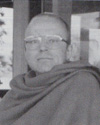
Jakusho Kwong Roshi
Abbot
The Sonoma Mountain Zen Center
Santa Rosa, California
“A moment of silence in the schools is a good start—a good start for teachers, too. Just sitting up straight in a relaxed way for a moment helps us regain our natural composure and sense of dignity. It is like an exploration for teachers as well as students, exploring a gigantic area. Because something is needed. This is a stepping-stone—returning to silence.”
Reverend Masao Kakuryo Kodani
Priest
Senshin Buddhist Temple
Los Angeles, California
“Our temples have traditionally been against it—for the past one hundred years or so—in L.A. in particular. Prayer in classrooms is like telling the children that there is only one form of communication with the supreme reality. The implication is that the ultimate reality is separate from us, which is problematic from a Buddhist point of view. Why not make prayer mandatory for postal workers instead? Why mandate prayer only for children, who do not have a choice? For generations Japanese-American Buddhists have had to contend with such language as ‘One nation under God.’ ‘Let us pray’ was a refrain commonly accepted, but not something that we felt included in.”
 Yvonne Rand
Yvonne Rand
Zen Teacher
Nuir Beach, California
“We desperately need some experience of silence in our society. Children especially have little experience of silence. We are trained for distraction and entertainment. So it seems to me that such a thing can’t be anything but of benefit.
“I hope this conversation doesn’t get politicized to such an extent that the question of an inner life as a legitimate focus of concern gets entirely lost. But I am afraid it is very likely to get lost.”

Thanissaro Bhikkhu
Abbot
Metta Forest Monastery
Valley Center, California
“If we really want to teach our children spiritual values, we’re going to have to conduct this discussion in a wise and generous way, because they’re watching it too. And we had better come up with something better than a national moment of silence, because that will sound like a moment of national embarrassment over the fact that we can’t agree on anything.
So how about a daily guided goodwill meditation? I can’t imagine anyone having a reasonable objection to having kids take a few minutes every morning to think thoughts of goodwill for themselves, their parents, their teachers, their classmates, and all other beings at large. Of course, if we don’t want them to view this as an exercise in hypocrisy, we’ll have to get adults working in important institutions—such as government, the insurance companies, and the stock and currency exchanges—to do the same thing too, and then conduct their business as if they meant it.”

Jack Kornfield
Teacher
The Spirit Rock Center
Woodacre, California
“A moment won’t do it. We need a year of feeding the hungry and walks in nature, a decade of generosity and meditation, of peacemaking and revisioning our schools and renewal of our spirit. But perhaps we can start where we are. Let us follow the middle path of the listening heart, encouraging respectful silence and tolerance, one moment after another.”

Dennis Genpo Merzel Sensei
Abbot
Kanzeon Zen Center
Salt Lake City, Utah
“If anything, I advocate periods of reflective silence in schools, without particular religious overtones, to allow students the space to explore personal and religious questions.
But while we as Buddhists may see a time of silence as a positive practice, even this silent period could be a problem to some. By simply encouraging a period of silence or prayer, we may be unintentionally fostering our own agenda of beliefs. For example, for atheists any form of prayer would be unacceptable. And there are other traditions where prayer or silent time is not encouraged and the emphasis is put on sermons, hymns, chanting, or rituals. How would a school prayer program serve all of these traditions?”

Tsultrim Allione
Spiritual Director
Tara Mandala Retreat Center
Pagosa Springs, Colorado
“I think it’s a good idea. There’s so little in our culture which gives us any experience of space. Especially for children. They have a natural speediness. That—coupled with television and video games—means that they live their lives without any gaps. I don’t agree with having prayer in the schools, because that imposes something. But silence gives people a space to develop a relationship to themselves.”

Jan Chozen Bays
Teacher
The Zen Community of Oregon
Portland, Oregon
“Many children, particularly in urban settings, have no refuge from the violence, fear, and loneliness of their lives. It could be helpful for them to learn to enter an inner source of peace, refuge, and ultimate connectedness.
My concern is that offering a moment of silence or prayer at school does not provide the context to develop that true refuge. In fact it is more likely to open the door to sectarian disputes in which Jewish, Muslim, Buddhist, and atheist children are made to feel at best different, at worst heathen or damned. Buddhist teachers in Europe have told me that children raised in Buddhist families in predominantly Catholic countries are regarded as influenced by the devil. If this is the direction school prayer or silence takes, I am not in favor of it. When families and churches teach children prayer or meditation, children are then free to use these any time, in school or out, without pressure or censure.”
Thank you for subscribing to Tricycle! As a nonprofit, we depend on readers like you to keep Buddhist teachings and practices widely available.